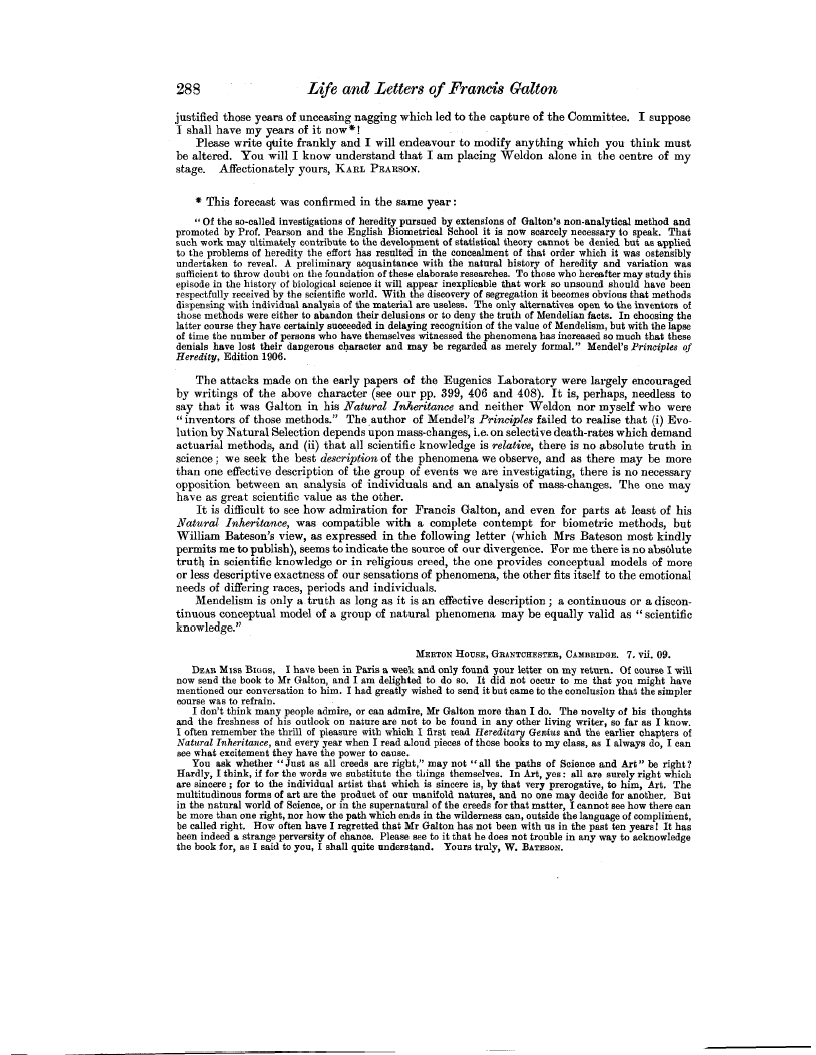| ||||||

OCR Rendition - approximate
288 Life and Letters of Francis Galton justified those years of unceasing nagging which led to the capture of the Committee. I suppose I shall have my years of it now Please write quite frankly and I will endeavour to modify anything which you think must be altered. You will I know understand that I am placing Weldon alone in the centre of my stage. Affectionately yours, KARL PEARSON. This forecast was confirmed in the same year °' Of the so-called investigations of heredity pursued by extensions of Galton's non-analytical method and promoted by Prof. Pearson and the English Biometrical School it is now scarcely necessary to speak. That such work may ultimately contribute to the development of statistical theory cannot be denied but as applied to the problems of heredity the effort has resulted in the concealment of that order which it was ostensibly undertaken to reveal. A preliminary acquaintance with the natural history of heredity and variation was sufficient to throw doubt on the foundation of these elaborate researches. To those who hereafter may study this episode in the history of biological science it will appear inexplicable that work so unsound should have been respectfully received by the scientific world. With the discovery of segregation it becomes obvious that methods dispensing with individual analysis of the material are useless. The only alternatives open to the inventors of those methods were either to abandon their delusions or to deny the truth of Mendelian facts. In choosing the latter course they have certainly succeeded in delaying recognition of the value of Mendelism, but with the lapse of time the number of persons who have themselves witnessed the phenomena has increased so much that these denials have lost their dangerous character and may be regarded as merely formal." Mendel's Principles of Heredity, Edition 1906. The attacks made on the early papers of the Eugenics Laboratory were largely encouraged by writings of the above character (see our pp. 399, 406 and 408). It is, perhaps, needless to say that it was Galton in his Natural Inheritance and neither Weldon nor myself who were "inventors of those methods." The author of Mendel's Principles failed to realise that (i) Evolution by Natural Selection depends upon mass-changes, i.e. on selective death-rates which demand actuarial methods, and (ii) that all scientific knowledge is relative, there is no absolute truth in science ; we seek the best description of the phenomena we observe, and as there may be more than one effective description of the group of events we are investigating, there is no necessary opposition between an analysis of individuals and an analysis of mass-changes. The one may have as great scientific value as the other. It is difficult to see how admiration for Francis Galton, and even for parts at least of his Natural Inheritance, was compatible with a complete contempt for biometric methods, but William Bateson's view, as expressed in the following letter (which Mrs Bateson most kindly permits me to publish), seems to indicate the source of our divergence. For me there is no absolute truth in scientific knowledge or in religious creed, the one provides conceptual models of more or less descriptive exactness of our sensations of phenomena, the other fits itself to the emotional needs of differing races, periods and individuals. Mendelism is only a truth as long as it is an effective description; a continuous or a discontinuous conceptual model of a group of natural phenomena may be equally valid as " scientific knowledge." MERTON HousE, GRANTCHESTER, CAMBRIDGE. 7. vii. 09. DEAR Miss BIGGs, I have been in Paris a week and only found your letter on my return. Of course I will now send the book to Mr Galton, and I am delighted to do so. It did not occur to me that you might have mentioned our conversation to him. I had greatly wished to send it but came to the conclusion that the simpler course was to refrain. I don't think many people admire, or can admire, Mr Galton more than I do. The novelty of his thoughts and the freshness of his outlook on nature are not to be found in any other living writer, so far as I know. I often remember the thrill of pleasure with which I first read Hereditary Genius and the earlier chapters of Natural Inheritance, and every year when I read aloud pieces of those books to my class, as I always do, I can see what excitement they have the power to cause. You ask whether "Just as all creeds are right," may not 10 all the paths of Science and Art" be right? Hardly, I think, if for the words we substitute the things themselves. In Art, yes: all are surely right which are sincere ; for to the individual artist that which is sincere is, by that very prerogative, to him, Art. The multitudinous forms of art are the product of our manifold natures, and no one may decide for another. But in the natural world of Science, or in the supernatural of the creeds for that matter, I cannot see how there can be more than one right, nor how the path which ends in the wilderness can, outside the language of compliment, be called right. How often have I regretted that Mr Galton has not been with us in the past ten years 1 It has been indeed a strange perversity of chance. Please see to it that he does not trouble in any way to acknowledge the book for, as I said to you, I shall quite understand. Yours truly, W. BATESON.
|